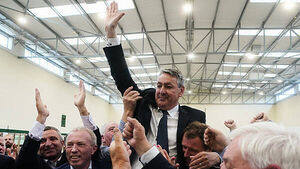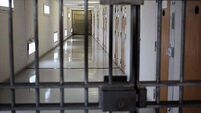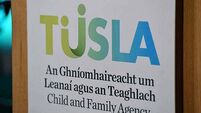Billy Kelleher confirms he is seeking Fianna Fáil nomination for president

By Gráinne Ní Aodha, PA
Billy Kelleher has confirmed he is seeking the Fianna Fáil nomination for the presidential election.
It emerged on Thursday that the Ireland South MEP was seeking support among Fianna Fáil TDs and senators for his nomination as candidate.
Reports have suggested that former Dublin football manager Jim Gavin could also be a possible Fianna Fáil nominee.
Mr Kelleher, a former Cork North-Central TD and junior minister, who was a farmer before becoming a politician, said he would be a unifying force as president.
Asked if Fianna Fáil leader and Taoiseach Micheál Martin was happy that he was putting himself forward, Mr Kelleher said the leader of a democratic party could not be “unhappy with having a robust” debate on its electoral candidate.
Fianna Fáil’s parliamentary party is expected to make a decision on the presidential election in the early autumn.

So far, left-wing independent Catherine Connolly is the only candidate who has secured the backing needed to get on the presidential ballot paper.
The Galway TD has the backing of Labour, the Social Democrats, People Before Profit-Solidarity and independents.
Sinn Féin has yet to announce whether it will support Ms Connolly or run its own candidate.
Heather Humphreys and Seán Kelly are in a race to secure the Fine Gael nomination, after the withdrawal of Mairead McGuinness in mid August “on medical advice”.
A presidential election is expected towards the end of October, as it must take place in the 60 days before the second term of president Michael D Higgins ends on November 11th.
To be eligible to run, a candidate must be nominated either by 20 members of the Oireachtas or four local authorities.
Although figures such as MMA fighter Conor McGregor and Riverdance star Michael Flatley have said they are looking to run as presidential candidates, they would need to gather this support to be on the ballot paper.
Speaking on RTÉ Radio, Mr Kelleher said he had first been approached by Fianna Fáil figures in April and May about running, but there was no formal process in place at the time.

He said that once he publicly called for a process to allow people to put their names forward, in August, he was approached again by party members.
“I spoke with Micheál Martin, the leader of the party, last night, and I informed him that I will be putting my name forward,” he told RTÉ’s News at One programme.
Asked if Mr Martin was happy that Mr Kelleher was looking to become a candidate, he said: “I honestly believe that nobody who leads a democratic party could be unhappy with having a robust, rigorous debate within the party to find a candidate to represent the party in a very important (election).
“The reason I put my name forward is because over the last number of days, there’s been quite a sizeable number of parliamentary party colleagues contacting me, asking me to keep my name there, to put my name forward.
“I wanted to give Micheál Martin the courtesy of speaking with him, and I did that last night to inform him that I would be contesting, and now I’ve contacted all parliamentary party members to inform them, and I’m also speaking to them privately on (the) phone as well.”
Asked why he would be a suitable president, he said he played a “very key role” in the Eighth Amendment debate, where he was in favour of liberalising Ireland’s strict abortion laws, and said he had “a lot to offer in terms of bringing groups together”.
He said he has spoken out on Gaza and on Ukraine for “many, many years”.
“I have three children. I love this country, I’ve served in public life all my life,” he said.
“My first election was in 1992 and I honestly believe that we now have a new era, a 100 years of our state, we just celebrated the 100-year anniversaries not so long ago.
“I think that is a huge opportunity, we have a very young population, an expanding population, and I believe there’s an opportunity now to have a broad debate among ourselves as a people, about the type of Ireland we want.
“I’d like to bring that debate at the centre, rather than the extremes of the left, the right, which divide, rather than unite.”




